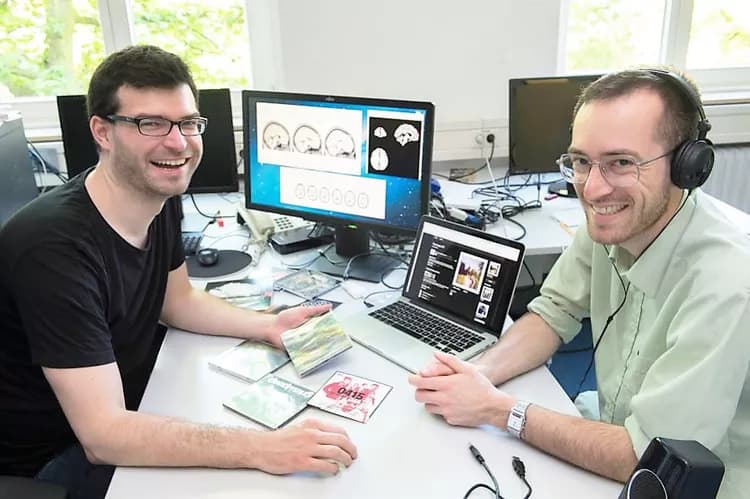As soon as social considerations also play a part in economic decisions, our brain seems to switch to a different processing mode. At least this is indicated by the results of a current study that was conducted at the University of Bonn. In it the participants were able to purchase pieces of music but could themselves set the price to be paid. During the process, the researchers recorded the brain activity of the participants. The work will soon appear in the journal Frontiers in Psychology but can already be called up online.
In 2007 the band Radiohead made music history with an unusual step: They put their new album on the Internet for downloading -- without asking for a set price. Instead, the fan themselves were able to decide how much they were willing to pay. In an economic respect, this experiment was at least a partial success: Some music fans succumbed to the temptation to download the songs without paying. Others paid voluntarily for the album -- some up to 20 dollars, which is twice as much as it would normally have cost.
Thus, in such "pay what you want" offerings, it seems to be not only economic interests that play a role but also social considerations, such as fairness. However, what happens in the brain in such situations remained unknown until now. The pilot study just published provides an initial answer to this question. The participating scientists at the University of Bonn and the University of Ulm invited a total of 25 participants to an experiment in a brain scanner. The subjects first listened to a 30-second clip from a piece of music. They were then to decide whether they wanted to buy the associated album or not.
In some cases the test persons were free to decide how much they wanted to pay for the album. Under this "pay-what-you-want" condition, they were able to keep the songs regardless of the amount paid, no matter what. In other cases, the scientists had set a fixed price, they amount of which was unknown to the participants. The participants could also suggest a monetary amount but did not know that they could only get the album, if their suggestion was over the price set. During the process the researchers recorded brain activity.
Enjoyment dictates the bid
"In the fixed price scenario, we found activation patterns that met our expectations exactly," explains Dr. Sebastian Markett of the Department of Differential and Biological Psychology: "As soon as they listened to the music clip, the participants showed activity in certain brain structures that are part of the so-called reward system. The better they liked the piece, the stronger the activation -- and the higher then the amount they bid for the album." In this case, therefore, the music enjoyment dictated the bid.
It was quite different, when, after listening to the piece, the participants heard that they could determine the price themselves. In these cases, the strength of activation did not permit a direct conclusion about the amount that the participants would later pay. Instead, in them, a region of the brain became highly activated that had been completely unremarkable under the fixed price conditions: the so-called lingual gyrus. "We combed through databases for studies in which the lingual gyrus was also activated and statistically analysed the hits -- actually several hundred," explains the lead author of the study, Simon Waskow. "According to them, this is an area that reacts very early to visual stimuli that have a social component." For example, the lingual gyrus sounds the alarm, when we discover an expression of rejection in a face.
"When our participants read that they themselves could choose the price for the piece just heard, their lingual gyrus became active," says Waskow. "This activation may have caused their brain to switch to another mode: Now, in making the decision, no longer just economic and emotional considerations but also social considerations, such as the fairness concept, were considered." This explanation is still just a hypothesis. However, the scientists hope to firm up their conclusions in further studies with more test participants.
The above post is reprinted from materials provided by Universität Bonn.Note: Materials may be edited for content and length.
Disclaimer: DoveMed is not responsible for the adapted accuracy of news releases posted to DoveMed by contributing universities and institutions.
Primary Resource:
Waskow, S., Markett, S., Montag, C., Weber, B., Trautner, P., Kramarz, V., & Reuter, M. (2016). Pay what you want! A pilot study on neural correlates of voluntary payments for music. Frontiers in Psychology, 7, 1023.
Related Articles
Test Your Knowledge
Asked by users
Related Centers
Related Specialties
Related Physicians
Related Procedures
Related Resources
Join DoveHubs
and connect with fellow professionals


0 Comments
Please log in to post a comment.